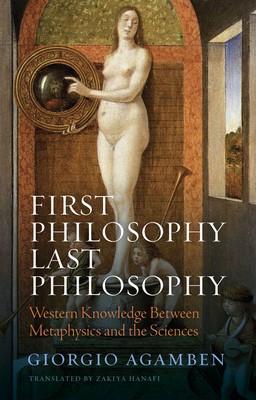
- We will send in 10–14 business days.
- Author: Giorgio Agamben
- Publisher: Polity Press
- ISBN-10: 1509560513
- ISBN-13: 9781509560516
- Format: 14 x 22.4 x 1.7 cm, kieti viršeliai
- Language: English
- SAVE -10% with code: EXTRA
Reviews
Description
What is at stake in that form of inquiry which the Western philosophical tradition has called first philosophy or metaphysics? Is this an abstract, now outmoded branch of philosophy, or does it address a problem that is still of great interest - namely, the unity of Western knowledge?
In fact, metaphysics is 'first' only in relation to the other two sciences that Aristotle called theoretical: physics and mathematics. It is the strategic sense of this 'primacy' that needs to be examined because what is at issue here is nothing less than the relationship of domination or subservience, conflict or harmony, between philosophy and science. The hypothesis of this book is that philosophy's attempt to use metaphysics as a way of securing its primacy among the sciences has resulted instead in its subservience: philosophy, once handmaiden to theology (ancilla theologiae), has now become more or less consciously handmaiden to the sciences (ancilla scientiarum). So it is all the more urgent to explore the nature and limits of this primacy and subservience, as this book does through an archaeological investigation of metaphysics.
This important re-reading of the Western philosophical tradition by a leading thinker will be of interest to students and scholars in philosophy, critical theory and the humanities more generally, and to anyone interested in contemporary philosophy and European thought.
EXTRA 10 % discount with code: EXTRA
The promotion ends in 23d.12:33:41
The discount code is valid when purchasing from 10 €. Discounts do not stack.
- Author: Giorgio Agamben
- Publisher: Polity Press
- ISBN-10: 1509560513
- ISBN-13: 9781509560516
- Format: 14 x 22.4 x 1.7 cm, kieti viršeliai
- Language: English English
What is at stake in that form of inquiry which the Western philosophical tradition has called first philosophy or metaphysics? Is this an abstract, now outmoded branch of philosophy, or does it address a problem that is still of great interest - namely, the unity of Western knowledge?
In fact, metaphysics is 'first' only in relation to the other two sciences that Aristotle called theoretical: physics and mathematics. It is the strategic sense of this 'primacy' that needs to be examined because what is at issue here is nothing less than the relationship of domination or subservience, conflict or harmony, between philosophy and science. The hypothesis of this book is that philosophy's attempt to use metaphysics as a way of securing its primacy among the sciences has resulted instead in its subservience: philosophy, once handmaiden to theology (ancilla theologiae), has now become more or less consciously handmaiden to the sciences (ancilla scientiarum). So it is all the more urgent to explore the nature and limits of this primacy and subservience, as this book does through an archaeological investigation of metaphysics.
This important re-reading of the Western philosophical tradition by a leading thinker will be of interest to students and scholars in philosophy, critical theory and the humanities more generally, and to anyone interested in contemporary philosophy and European thought.


Reviews